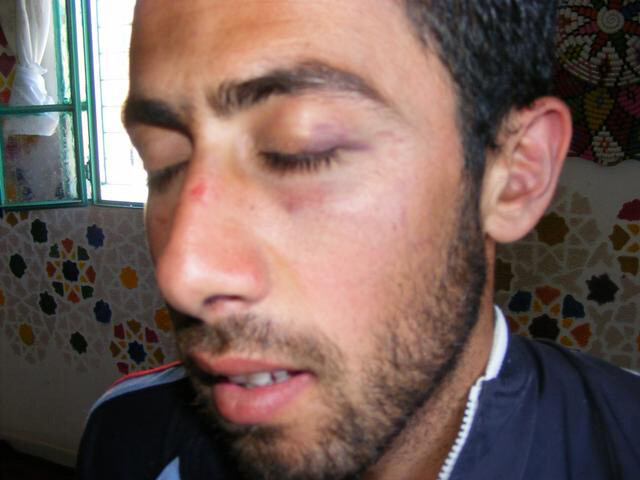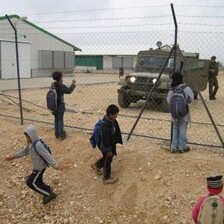The Electronic Intifada Chicago 25 February 2012
On 7 January 2010, something happened that changed irrevocably the way I see the world. That day, my friend Musab Raba’i was tortured by the Israeli military.
When I heard that Israeli Sergeant Benjamin Anthony would be speaking at DePaul University in Chicago yesterday, I had one question for him: why?
Musab’s story never got serious attention in the news media. The soldiers who attacked him were never prosecuted. I couldn’t help myself. I wanted to ask a member of the Israeli military to answer for what soldiers did to my friend. So I stood up, looked Anthony in the eye and asked him to explain what happened to Musab. Anthony never answered my question.
These are the events that I challenged Anthony, founder of the propaganda outfit Our Soldiers Speak, to explain. As the above video shows, on 7 January two years ago, Musab was grazing his sheep on his family’s land in the village of al-Tuwani. The morning was quiet and beautiful. Then Musab and his brother noticed an Israeli settler observing them from the settlement outpost Havat Maon and speaking on his cell phone. Soon they noticed an Israeli military jeep arrive and stop to speak with the settler.
Three Israeli soldiers approached the shepherds and ordered them to leave the area. Musab and his brother explained they were on their land, but agreed to move further down into the valley. The soldiers followed them and grabbed at Musab’s brother. Musab began to drive their sheep away faster, but a second army jeep stopped them. Three more soldiers stepped out of the jeep.
Pushed to the ground
The soldiers began to hit Musab and his brother with their rifle butts. They pushed Musab and kicked his brother while other soldiers held him to the ground. Musab’s family and friends ran to intervene. His mother and sisters-in-law tried to calm down the soldiers. They pushed him to the ground. Soldiers fired sound grenades and tear gas into the small group of women and children gathered nearby on the hillside. Then they grabbed Musab and shoved him into the back of their jeep.
Soldiers blindfolded Musab and took him to the Susiya military base. Soldiers struck him in the back, in the face, and slammed him into the walls. The soldiers questioned him about his brothers. Musab refused to give any information and refused to speak Hebrew with the soldiers, which infuriated them.
The soldiers told him that they would come to his house in the following days and beat or kill him and his brothers. They tried to force him to say that they were the best soldiers in the Israeli military and beat him when he would not. When another soldier tried to bring Musab food and water, as the military is legally obliged to do in such situations, the soldiers who were torturing him swore at the soldier and told him to leave. The soldiers also refused to allow Musab to pray.
Blindfolded

Musab Raba’i suffered a black eye and other injuries after Israeli soldiers beat him.
Christian Peacemaker TeamsMusab told us that the soldiers tied his hands and feet, blindfolded him and sat him on a chair. He put his head in his lap, in an attempt to protect his head and his genitals, and refused to lift it. He said that at one point, a soldier cocked his rifle and told him to lift his head or he would shoot him. Musab refused.
After four hours, the soldiers took Musab to Kiryat Arba military base. The police held him for half an hour and then threw him — while he was still blindfolded and handcuffed — from a jeep to the side of the road. Afraid that settlers would find him, Musab crawled to a bush and hid until his brothers were able to find him. Musab was never charged with any crime.
Race-baiting
When I told this story to Anthony, he said that I was misguided. Because I used the words “West Bank” to describe where my friend Musab lives, he said that I was uneducated. He said that there is no occupation of Palestine and that I was “unhelpful” when I used the words “illegal Israeli settler.” Anthony said Israeli soldiers would never do something like what I described, but if they did, then Musab was probably a terrorist.
Yet what Anthony said to me was not the most disturbing part of his presentation. Throughout his presentation, Anthony urged his mostly Jewish audience to be ready to die for Israel. He said that Israel is the only safe place for Jews, the only homeland for Jews, and that Jews must fight for it. He said that Israel should be willing to attack Iran and audience members should make sure that the United States supports it. This event was, in fact, co-sponsored by the US Army Reserve Officers’ Training Corps (ROTC) program at DePaul. I felt like it was a military recruitment rally. “I know what this is,” said a friend of mine who was there. “It’s race-baiting.”
I left Anthony’s talk feeling sick to my stomach. But one thing he said gave me hope. “Every one of the guns I have ever fired has been stamped property of the United States,” he declared. I take that to mean one thing: we can help stop Israeli apartheid.
Since the day that Musab was tortured, I have devoted my time the boycott, divestment and sanctions movement. I will not monetarily support Israel’s occupation of Palestine. We must end business as usual with Israel.
Joy Ellison spent three years in al-Tuwani, a small village in the south Hebron hills which is nonviolently resisting settlement expansion and violence. Joy is a graduate student at DePaul University and is currently finishing a graphic novel about al-Tuwani; follow Joy on Twitter: @j_in_tuwani.





